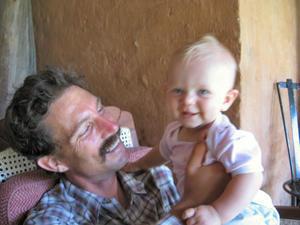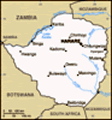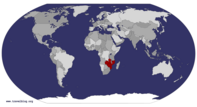Advertisement

 Ben and Anna
Ben and Anna
Ben Freeth with his 10 month old daughter AnnaFirst published in The Edmonton Journal, May 6, 2006
The thing the darkness hates most is the light,
Zimbabwean commercial farmer Ben Freeth tells me.
Ben is referring to the fear and destruction propagated by Robert Mugabe’s regime in a land that was once an African success story. In the past 10 years, Mugabe has destroyed what was once the
bread basket of Africa
.
Zimbabwe had never experienced a food deficit before the former rebel leader began his unpopular land reforms in 2000. My cousin, Ben, and his family are trying to fight the corruption and greed in the Zimbabwean government openly and transparently, but this has proved to be both challenging and dangerous. They hope to hold the Zimbabwean government accountable for its actions and, ultimately, to hold onto their mango and citrus farm in central Zimbabwe in which they have invested so much.
Mike Campbell, Ben’s father-in-law, has never known anything but farming in Africa. In fact, his family has been farming in Southern Africa since 1713.
Ben and his wife, Laura, were married at the Campbell safari lodge on the banks of the Biri River over a decade ago. It was an idyllic wedding where the guests sat on hay bales by the river

 Laura and the boys
Laura and the boys
Laura, Joshua and Stephen completing homeworkand a piano in the back of a pickup truck filled the air with music. Sadly, in one of the many acts of intimidation to force the family from the farm, all of the doors and door frames, windows and window frames from the lodge have been stolen. The toilets and sinks have been smashed into pieces. Parts of the thatched roofs have been burned. The lodge has been left in ruins, crumbling.
Farmer vowed to fight The last time an attempt was made to confiscate the farm, the family was told they had three days to leave. Mike, a vital man in his 70s, told the officials that he had lived a good life, had nowhere to go, and would still be there when they returned. He added that they’d better bring a coffin for him — and 30 more for those coming to evict him because he wouldn’t go without a fight.
Nor will my cousin Ben. He was an outspoken member of the Zimbabwe Commercial Farmer’s Union (ZCFU) until the organization all but disintegrated in August 2002. At a ZCFU conference that month, Ben read a prayer directed at the farmers who were confident

 The Campbell Mango Factory
The Campbell Mango Factory
Most of these mangoes will be exported to South Africa and the United Kingdomthe government was co-operating with them and willing to negotiate.
The prayer implied that the farmers were lacking humility in the face of their opposition, and must swallow their pride or face destruction. Unfortunately, the vice-president of Zimbabwe and a number of cabinet ministers were unexpectedly in attendance, and they wrongly assumed the prayer was directed at Mugabe’s government. Two weeks later, people were arrested on a massive scale. The army gave people 24 hours to leave — and many did. But the Campbells remained on their farm.
Although Mike Campbell is still in control of nearly half of his land, 1,200 hectares have been given to 56 squatter families. There’s an uneasy relationship between Mike’s family and the squatters. Meetings between the squatters and the Campbells have been forums for the squatters to make demands for food or to request that the Campbells plow their fields for them. All agreements to date have been broken by the squatters. Rather, the squatters have been violent and destructive: burning bales, driving cattle away, destroying haysheds and other buildings. Family members and farm workers have been assaulted and death threats issued. A much-needed irrigation pump has had to be replaced for

 Laura’s Linens
Laura’s Linens
Embroidering fine linensthe third time — it has been stolen twice.
To say the least, it was eye-opening for me to jog through the gorgeous mango orchards at 6 a.m. and run into two guards with automatic weapons protecting the mangoes from squatters!
Ten years ago, when I left Zimbabwe, the exchange rate was $7 Zimbabwe to $1 US. When I arrived back in the country last month, the black market exchange rate was $200,000 ZD to $1 US. Two days later, it was $210,000 ZD to one greenback. Inflation was 782 per cent in March, and 620 per cent the month before. Currently, price quotes on goods and services are only valid for 24 hours.
Everybody has an anecdote about how difficult it is to deal with the wads of cash needed for daily errands. One person amusedly recounted how a woman carried her money into the bank in a garbage can.
Black market exchanges Interestingly, the official exchange rate is half the black market rate. Any business which brings foreign currency into the country must exchange the money at the official rate. The government then takes it to the black market itself to get twice

 The Freeth home
The Freeth home
Ben and Laura built their home 6 years ago and had originally planned to have a restaurant on the second levelas much money as was originally invested in the country. Thus, the official rate is deliberately kept low so the government can profit.
This profit is visible in the number of new imported vehicles circulating around Harare for Mugabe’s supporters. In all the turmoil and newly created poverty, some people are becoming very rich.
Strangely, Harare — the capital — looks unchanged on the surface. In fact, there are several new development sites, and the city is clean and manicured as in the past. But below the surface and hidden on the periphery, people are suffering. The real devastation can be seen in the eyes of the people: those without access to drugs to help stem the devastation of HIV/AIDS, and those who are very, very hungry.
Harare’s looks unchanged these days in part due to the infamous Murambatsvina (Operation Clean-Up Trash) last July. At the time, 700,000 people lost their homes all over the country. City dwellers were put in government vehicles in the night and dumped in rural areas in the middle of nowhere.
Rival tribe fears reprisals There is fear in the air. That’s part of the reason why people don’t rise up against Mugabe. Back in the early 80s, Mugabe, who hails from the Shona tribe, slaughtered thousands of Ndebeles, the other large tribe in Zimbabwe.
Although the Ndebele are the descendants of the war-like Zulus, past violence has made them timid in the face of the Shona regime. Most foreign observers have confirmed that elections for the past decade have been rigged since Mugabe can count on deceased voters for support and there is widespread intimidation at the polls.
The salary of government officials was recently frozen for the remainder of the year. No adjustments will be made for the skyrocketing cost of living, and there won’t be any bonuses. One government employee told me he makes $7.5 million ZD per month.
A recent study put the poverty line at $20 million ZD per month. To rent a room in Harare costs $5 million a month and $2.5 million will buy two bags of groceries. How can one support a family?
This employee in particular has started a security business on the side to make ends meet. The lucky ones hold a couple of jobs. But these are difficult times since unemployment rates hover around 80 per cent.
Since Mugabe’s government has been isolated by western leaders, the government has a new policy of
looking east
to China. There has been a large influx of Chinese immigrants and poor quality goods.
Three months ago, 30 army and police officers arrived at Ben’s farm to announce that cabinet minister Nathan Shamuyarira has given the Campbells 90 days to leave the property — a profitable mango, citrus and maize farm about 100 kilometres outside Harare.
Last July, when Shamuyarira made his last such demand, the family replied they would use the law to challenge the theft of their private property without compensation. A few days later, a local paper headline quoted the minister saying that problem could be solved simply by changing the law, and sure enough, last fall the government amended the constitution to nationalize 95 per cent of rural titled land, and gave current owners no recourse to justice.
This leaves Ben’s family in a tough spot. With three children six years of age and under, and a house they built only six years ago, the Freeths have a lot to lose.
Five years ago, they operated a restaurant in their home. Now, there are few who go out to eat — and those who’d like to don’t have the money to do so.
Currently, young Joshua and Steven are attending a private school — but like most things in Zimbabwe, its future is uncertain.
A recent education law will enable the state to set private school fees. With skyrocketing inflation, this means the schools are likely to be financially starved.
The problem is compounded by another decree that the three official languages (English, Shona and Ndebele) must be given equal teaching time. Few teachers are able to teach in all three languages. As a result, more staff will have to be hired to comply with regulations, which will cut into shrinking resources.
Farm family remains hopeful The amazing thing is that the Freeths are so hopeful. Ben is planting a maca-damia nut orchard. He repeatedly, and excitedly, explains how anything can be grown here. The farm could be gone tomorrow, but the family lives for each day, as it comes. There are no plans for the future other than to fight for the farm and carry on farming.
Currently, a large portion of the family’s income comes from Laura’s Fine Linens Company. When farming became difficult, Laura started an upscale linen business for export to the U.K.
Thanks to a South African distributor, the tablecloths and bed sheets embroidered with intricate designs of Zimbabwean people and fauna are now distributed all over southern Africa. Anywhere from 50 to 100 women are employed at a time, and Laura has chosen to keep the company small despite growing demand for her products.
The situation in Zimbabwe can’t last much longer. Mugabe is in his early 80s and dissent is growing.
What will follow his despotic regime is unclear, since the opposition is divided. Most likely someone from within the ranks of the ruking ZANU-PF will take the reins but it is doubtful as to whether this individual could enjoy the same respect and support from the party that Mugabe has managed to keep.
One can only hope this tragic passage in Zimbabwean history will have a positive ending.
Rachel Maser, a U of A mechanical engineering graduate, is currently spending a year in southern Africa working with Engineers Without Borders. Her family lived in Zimbabwe in the early 1990s.
Background on Commercial Farming in Zimbabwe
Orginally published in the Edmonton Journal
After Zimbabwean independence in 1980, much of the land owned by white commercial farmers was to be returned to black Zimbabweans. The land reform program was supposed to fairly compensate the white commercial farmers.
At the time, one-third of available land in Zimbabwe was used for commercial farming, mostly by farmers of European descent. By 2000, one-quarter of the land remained designated as commercial, with the balance diverted to the resettlement program. Although land was unfairly distributed in the past, commercial farmers were an integral part of Zimbabwe’s economy, producing tobacco, maize, cotton, coffee and tea for domestic consumption and export.
Threat prompted action But the Zimbabwean government took little action on land reforms until February 2000 when the opposition party, Movement for Democratic Change (MDC) was gaining popularity in the lead-up to the June 2000 elections. At the time, 25 per cent of Zimbabwe’s population was living on commercial farms and was thus subject to intense intimidation. That month, so-called “war veterans” began to seize the land of white farmers all over the country. Many of these “war veterans” were no more than 20 years old and could not have possibly fought in the war of independence from 1975 to 1980.
In fact, many were unemployed youth hoping to be rewarded for their loyalty to Mugabe’s ruling ZANU-PF party.
Most of the farmers targeted by the land reforms, although of European descent, are for all intents and purposes African themselves. They have never lived anywhere but Africa, and have no claim to citizenship in any other country. In the early stages of the land reform, farmers were murdered and tortured. Fear of such treatment spread rapidly, and thousands of farmers fled to Europe, Australia and other countries in Southern Africa. Most farmers have only distant ties to these countries and they are as foreign to them as Africa is to Canadians.
Once a farm was seized, the land was either divvied up and given to rural farmers with few farming implements and a limited ability to farm, or to a government official loyal to Mugabe hoping to profit from his or her newly acquired land. The problem was and is that these officials do not live on the farms nor do they invest money in the farm or staff.
Yields have plummeted and labourers have either been laid off or are severely underpaid. In the past, most commercial farmers employed hundreds of staff and provided schools and health facilities for them. By displacing commercial farmers, Mugabe has also destroyed the livelihoods and the security of a significant portion of his people. A decade ago, there were 4,000 commercial farmers in Zimbabwe. Current estimates range from 300 to 400.
Advertisement
Tot: 0.14s; Tpl: 0.013s; cc: 9; qc: 50; dbt: 0.0775s; 1; m:domysql w:travelblog (10.17.0.13); sld: 1;
; mem: 1.2mb








